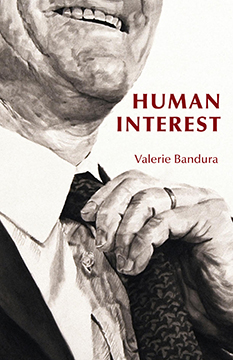Joel Salcido Reviews Valerie Bandura's Human Interest
Valerie Bandura: Born in the former Soviet Union, Valerie Bandura's first book, Freak Show, was a 2014 Patterson Poetry Prize Finalist. Her poems have appeared in American Poetry Review, Ploughshares, The Gettysburg Review, ZYZZYVA, Alaska Quarterly Review, Crazyhorse, Mid-Atlantic Review, Third Coast, Prairie Schooner, River Styx, Beloit Poetry Review, Best New Poets, and many others. She was the recipient of fellowships and scholarships from the Vermont Studio Center and Bread Loaf Writer’s Conference. She teaches creative writing at Arizona State University.
Valerie Bandura’s second collection of poetry, Human Interest, is all Americana: a gun-toting, unapologetically surly, bombardment of sardonic imagery. Bandura conjures the Grateful Dead line—what a long, strange trip it’s been—if that lyric had been laced in sarcasm. The poems have unmistakable breadth: with topics ranging from immigration, to mental illness, to the vapidity of social media, and while the critiques can be scathing, the poems try a little tenderness, too.
Bandura initiates the collection with a romping scene of a carnival-like BDSM bar where the imagery unfurls like a whip, “a red-lit bar and a vampire bartendress / who pointed to a man in a harness / licking the boot of a woman, dog collared.” This scene wets our toes, sure, but more so it feels intended to contextualize the “Ka-boom” epiphany that underlies the collection.
In the introductory poem’s denouement there’s a moment of clarity and we are slipped vulnerability like a mysterious pill, “I mean / to release me from what secrets / and lies I tell the people I trust / never to lie to me, compulsions, obsessions, / perversions, all that pent up inertia / erupting in a cataclysmic cloud.” Readers can breathe in this cloud and to feel its effects as they move through the poems.
Understanding this moment of unmitigated honesty allows for the irony and sarcasm that runs through most of the book to feel less like a shotgun blast of surliness but rather to become a profound meditation on the brokenness of humanity. These meditations hold no pretense or artifice. They are direct, pop-culture idiosyncratic punches to the mouth of the ears. No one is safe or sacred in these poems, America becomes “The Biggest Baby Ever” a Bandura writes, “hurray / for being the least loved celebrity / on channel you can’t pronounce / in places you won’t dare go, famous / for being the freakishly loud.”
Where the tonality calms itself is where the book finds its tenderness in the middle section subtitled: “Nobody’s Crazy. And Everyone Is.” Here, the speaker shifts focus to family; as mother, wife, and sister delve into the inanity of roles and the emotional turmoil of having a sister living with mental illness.
In stark contrast to the heavily detailed and unfurling imagery of most of the collection “Between Me and Crazy” is more lyrical, the voice of the poem contemplates a communication breakdown between sisters. Its tone is one of longing, culminating in the final couplet’s admission, “you’re about to say something, / I can almost hear it.” This hearkens back to the secrets and lies that can only be told to the most trusted—in this case, the page and even beyond that, to the reader. This confession functions as therapy for the speaker because the readers are strangers who, even if they pass judgment, simply listen. Readers should feel the catharsis, and in turn, commiserate with the speaker. It is through this mutual consolation that readers may come to realize that the searing tongue of the collection’s voice is imploring them to laugh, to forget they are mourning at the wake of a broken world.
Joel Salcido is managing editor of Hayden’s Ferry Review and an MFA candidate in poetry at Arizona State University. His work has been featured in Write On, Downtown, Public Pool, The Decolonizer, and Four Chambers Press among others.
